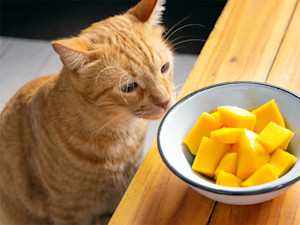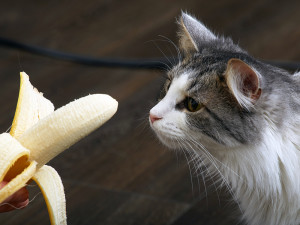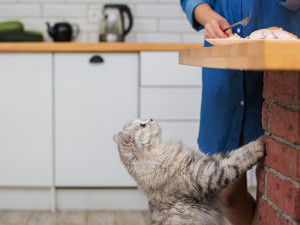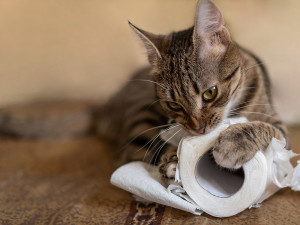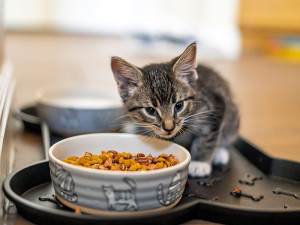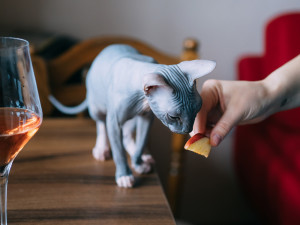Can Cats Eat Pineapple?
It’s the season of tropical-fruit salads after all.
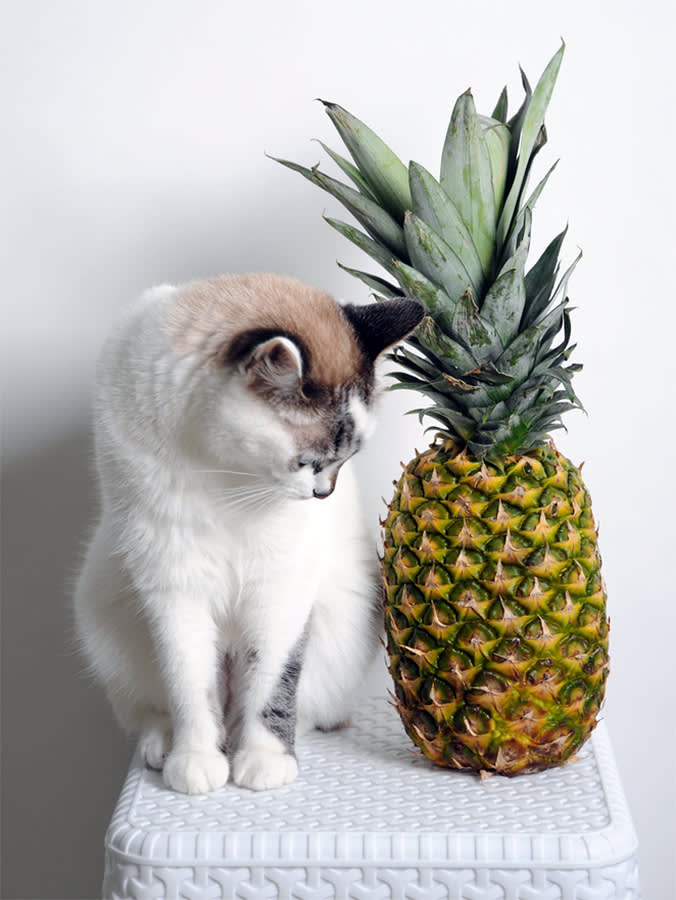
Share Article
Pineapple is a decadent fruit often associated with hospitality, luxury, and tropical getaways, all while being sweet, nutritious, and boasting some fascinating health benefits.
People often use the pineapple emoji to signify a complicated relationship, which is the perfect way to describe your cat’s relationship with pineapples; prickly, complicated, and best in small doses. While pineapple fruit is technically safe for cats, it is best saved for the occasional small treat. Read on to learn all about pineapples for cats.
Nutrition facts about pineapple for cats
Pineapples are the fruit of the Ananas comosus plant, which is in the Bromeliaceae family, commonly known as bromeliads. They are native to South America and over time were cultivated across many tropical climates including Central America, the Caribean, and Mexico.
The plant is considered a succulent and fun fact for those of us who can never have enough houseplants, it is very easy to propagate a whole new plant from the crown of a pineapple fruit and keep it as a houseplant. It usually takes about two years to grow a mature pineapple fruit, however, so don’t hold your breath.
The fruits are usually large, and can weight up to four pounds each. The outer rind of the fruit is very tough with spikes on it and it also contains a central core which is not edible. The fruit tends to be very sweet, although at times can be tart or sour.
Some people feel a tingling sensation in their mouth and throat after eating pineapple due to an enzyme called Bromelain. Although this can be unpleasant, Bromelain also has many health benefits and has been isolated, concentrated and used as a treatment for conditions like pain, inflammation, burns, and indigestion. The fruit also contains many valuable nutrients including fiber, sugar, vitamin C, potassium, and manganese, some of which are beneficial to cats as well as humans.
Is pineapple good for cats?
Pineapple is non-toxic to cats but is not considered to be good for cats. As obligate carnivores, cats have very specific nutritional requirements that are based on their natural diet of eating whole prey. This includes a high demand for proteins, fats, and particular nutrients while also having a lower need for carbohydrates.
In fact, they do not process sugars and carbohydrates as well as we do, so they can’t tolerate large amounts of sugary fruits like pineapple. In small amounts, pineapple can be fine for a very occasional snack and does contain some nutrients that cats can use including:
Fiber: Pineapple is a high fiber fruit, containing mostly insoluble fiber. This kind of fiber helps to bulk up the stool and prevent constipation. It also creates feelings of satiety, or fullness, without adding calories, which can be helpful for overweight pets that need to be on reduced calorie diets.
Vitamins and meralsin: Cats can benefit from certain vitamins and minerals found in pineapples including potassium, manganese and B vitamins. Unlike us, cats do not need to get vitamin C from their diet, however, since they can make their own.
Bromelain: Bromelain is an enzyme found in pineapple which can help break down proteins. It has been isolated and purified for many different health applications including treating pain, inflammation, and indigestion. While the amount found in a serving of pineapple is much less potent, it still has some beneficial effects.
Can cats eat any part of the pineapple plant?
Cats should not eat any parts of the pineapple plant or rind of the fruit. The outer surface of the rind and leaves contain thorn-like spines which can irritate the mouth and digestive tract. Ingesting large amounts of the plant can also cause digestive upset including voiting and/or diarrhea. Unripe pineapple fruits are also considered toxic to both humans and animals and can cause severe vomiting and diarrhea. If you do decide to grow your own pineapple plant, be sure to keep it out of reach of your cat.
Is pineapple completely safe for cats?
Pineapple is non-toxic to cats. As an occasional bite-sized taste, it is very safe. However, there are a few reasons to limit how much you share with your cat:
High in fiber: While fiber has many health benefits for cats, too much fiber can cause digestive upset including bloating, gas, and diarrhea. It is important to increase your cat’s fiber intake slowly to allow them to adjust. Start with just a small bite and see how your cat tolerates it.
High-sugar content: Pineapples contain lots of sugar which makes them delicious but also not a great choice for cats. Cats do not metabolize sugar as well as we do so eating lots of sugary snacks can put them at risk for weight gain and related health problems like diabetes and arthritis.
Other ingredients: If you are considering sharing pineapple with your cat that is part of a prepared dish, be sure to check that all the other ingredients in the dish are also safe and non-toxic for cats.
Avoid unripe fruits: Pineapple fruits that are not completely ripe can be toxic to both humans and animals and cause severe vomiting and diarrhea. Be sure to only share pineapple that is completely ripe with your cat.
The bottom line: Can cats eat human food?
Cats can eat human food from time to time as long as the foods are safe, non-toxic, and healthy for cats. There are many great options for foods that you can share with your cat but be sure to double check that anything you offer to your cat is free of toxic or unhealthy ingredients. Overall, cats really need to eat a complete and balanced cat food diet to ensure they are meeting their unique nutritional needs.
Treats and the occasional snacks of table foods should be limited so that they get the bulk of their diet from cat food that will provide all of the nutrients they need most. It is important to consider your cat’s overall caloric intake too, factoring in treats and table foods, so that you don’t unintentionally overfeed them, putting them at risk for weight gain and related health problems. Many indoor cats are quite inactive, which also puts them at risk for weight gain in addition to behavioral challenges related to boredom.
You can use treats and table snacks as a perfect motivator to get your cat moving; try hiding treats or dry food around the house, instead of putting it in their bowl so they have to search and work for it. There are also more challenging food puzzles and interactive toys you can purchase to help get your cat moving while also providing valuable mental enrichment. This can be a great way to use those special treats and table foods to make your cat’s life healthier, happier, and more delicious.
FAQs (People also ask):
How much pineapple can a cat eat?
Cats should only have the occasional taste of pineapple as it is very high in sugar.
Is it OK to give cats pineapple?
Pineapple is nontoxic for cats but high in sugar so should only be given as an occasional treat.
Why do cats like pineapple?
Cats may like the juicy, satisfying texture or the sweet smell of pineapple fruit but some may be turned off to the taste, especially if it is sour.
Can cats eat pineapple rind?
No, cats should not eat the rind or leaves of the plant as these can irritate their mouth and cause vomiting or diarrhea if swallowed.
Is pineapple safe for cats?
Ripe fruit is safe and non-toxic; however, unripe fruits are considered toxic.
References:

Dr. Amy Fox, DVM
Amy Fox, DVM is a small animal veterinarian in New York City. A lifelong animal lover, Dr. Fox studied biology in college and then worked as a veterinary nurse before pursuing veterinary school at Cornell University. She has worked in many different settings including shelter medicine, emergency medicine, general practice, and animal cruelty and forensics. She is especially interested in nutrition, preventative medicine and care for senior pets. Dr. Fox also enjoys writing about veterinary medicine and teaching. In her free time she loves to cook, garden, and go for long runs.
Related articles
![Cat asking for human food from counter]()
What Can Cats Eat Besides Cat Food?
Good news for your begging cat: Some of your favorite snacks are safe to share.
![Cute tabby cat playing with roll of toilet paper.]()
How to to Spot, Treat, and Prevent Pica in Your Cat
There may be a reason your cat can’t stop putting your hair ties in their mouth.
Can Cats Eat Peanuts?
They’re not technically dangerous, but they’re not ideal.
![Woman playing with her orange cat.]()
Why Does My Cat’s Breath Smell?
Oof, that is bad.
![Kitten eating dry food from a bowl.]()
Can a Kitten Eat Dry Food?
And the nutrients you should make sure they’re getting.
![A gray Sphynx cat sniffing an apple slice held out by her owner while standing on a table next to a glass of wine]()
Can Cats Eat Apples?
Yes, but the fruit might not hold much a-peel.

